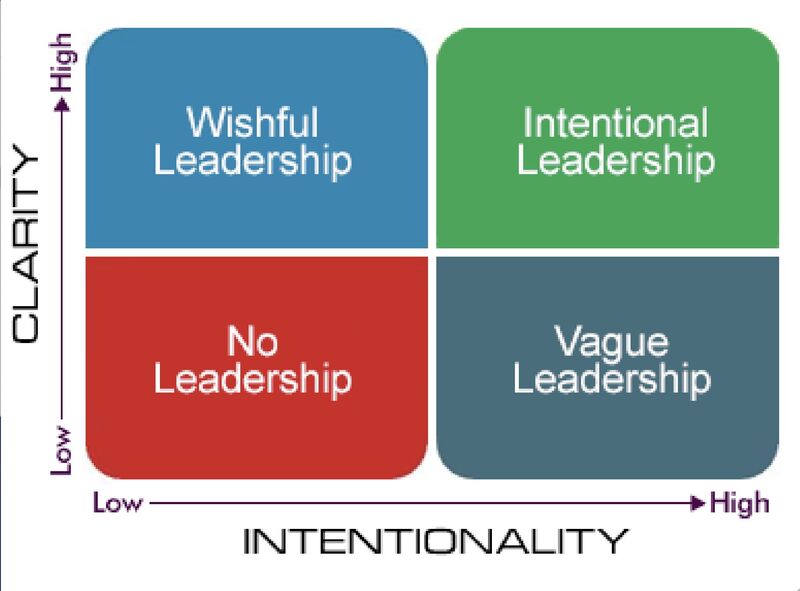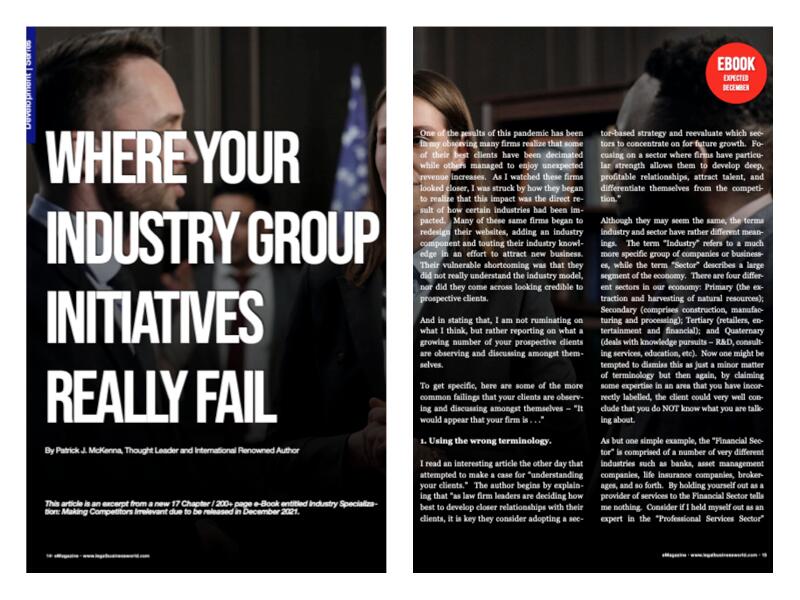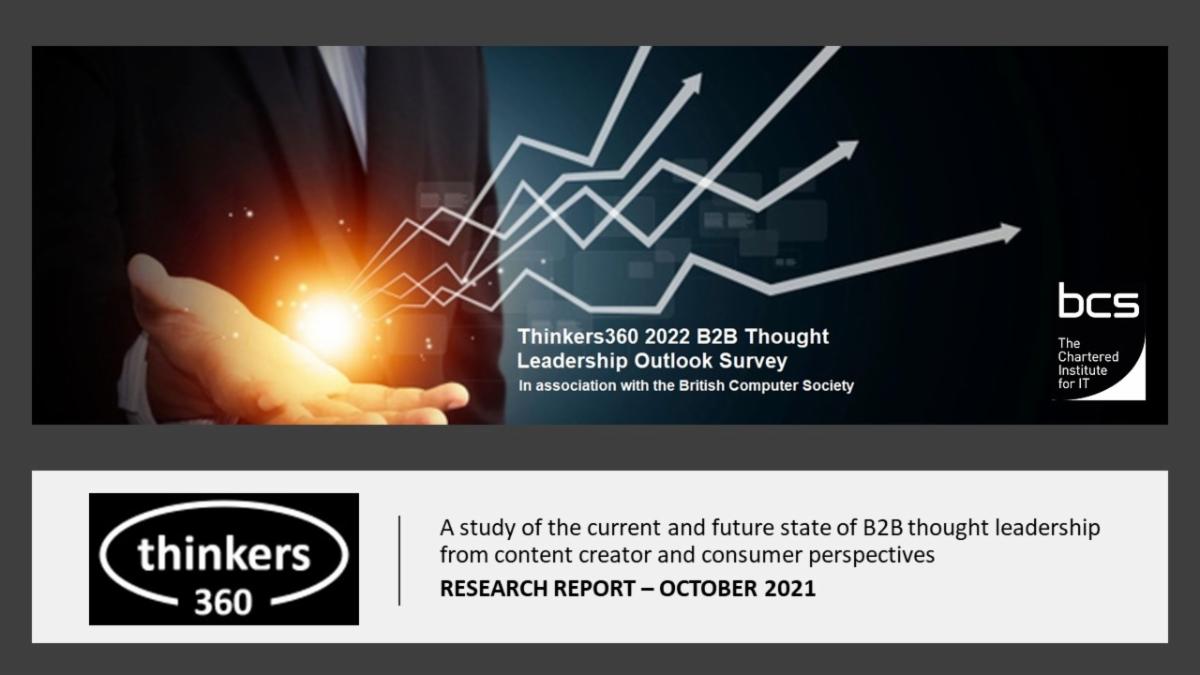http://www.patrickmckenna.com/blog
Page 1 2 3 4 5 6 7 8 9 10 Next >> of 95
Post #903 – November 29, 2021
There is No Vaccine for a Lack of Leadership.
 There are few people out there with bad intentions, but there are firm leaders with bad habits. Last week I spent an hour on a call with the Managing Partner from a 200+ lawyer firm who was seeking my counsel on succession planning and specifically with replacing their practice and industry group leaders, many of whom were very senior and had been in their roles for well over a decade. After being briefed, I began by asking five very basic questions: There are few people out there with bad intentions, but there are firm leaders with bad habits. Last week I spent an hour on a call with the Managing Partner from a 200+ lawyer firm who was seeking my counsel on succession planning and specifically with replacing their practice and industry group leaders, many of whom were very senior and had been in their roles for well over a decade. After being briefed, I began by asking five very basic questions:
First; do these group leaders have a formal, written job description? Answer: “No.”
Second; do these leaders have a clear understanding of precisely how many non-billable hours they are expected to spend leading and managing the people on their teams? Answer: “No.”
Third; have you provided these team leaders with any organized leadership training within the past three years, to help them enhance their individual performance? Answer: “No.”
Fourth question; have these leaders be given any written expectations, (such as you must, as a group, meet at least once per month) of what your firm’s leadership is expecting of them as team leaders? Answer: “No.”
Fifth question; do you, as the firm leader, meet with all of your team leaders to have them share and discuss their particular leadership challenges and successes with each other, at least once quarterly? Answer: “No.”
Final and very serious question, why are you bothering to even have practice and industry teams? Are these simply TINOs (teams in name only)?
Now, let me not leave anyone with the impression that this was, in any way, an isolated incident, or that the answers that I most often elicit from firm leaders, to these five questions, are wildly different in most other discussions that I’ve had.
It is still the case in too many law firms that we form these teams and then we say to the team leader we want you to manage this group; and we are very good at demanding that our people perform, but are distressingly useless in helping our people succeed. This is not a system designed to obtain measurable results.
So I guess the GOOD NEWS for those of you reading this is that your firm may continue to prosper in spite of itself, as most of your competitors perform just as pathetically. Or as my good friend, David Maister used to say, “the savings grace for today's typical law firm is that they only have to compete against . . . other law firms.”
But SADLY, that is rapidly changing! So, what are your plans for 2022?
Post #902 – November 15, 2021
Identifying Potentially Lucrative Legal Micro-Niches.
On my Twitter feed (@ConsultMcKenna) I’ve been identifying a number of Micro-Niche areas of opportunity that I do not see many law firms exploring. Here are 11 that I identified in just the past 3 months:
 • Robotics. • Robotics.
Companies in North America added a record number of robots in first 9 months of 2021. Factories and other industrial users ordered 29,000 robots, 37% more than during the same period last year, valued at $1.48 billion.
• Combatting Deepfakes
IMAGINE a video emerges of a CEO doing something ungodly - from being an insurance industry threat to advancing the need for repetitional management, deepfakes are becoming a reality & can lead to a dip in some company's stock.
• Alternative Finance
Think equity crowdfunding, initial coin offerings (ICOs), tokenization, and special purpose acquisition companies (SPACs) - many driven by the decentralized finance (DeFi) movement via a public decentralized blockchain network.
• Satellite Industry
This Industry may be moon-bound (as in 10x by 2030, according to McKinsey). There are many new live satellite imaging data use cases for small- to medium-sized businesses on the horizon.
• BNPL - "Buy Now - Pay Later"
Reshaping how people shop in the US and Europe, it’s remarkable that BNPL growth has found an untapped market of people who can’t or won’t use credit cards.
• “Finfluencers”
Finance firms have long struggled to reach young and new customers but now Wall Street Influencers are making $500,000, topping even the Bankers. These are social media influencers that use platforms like TikTok and Instagram to make financial advice digestible for younger audiences.
• Cryptocurrency Regulation
SEC Chair Gary Gensle asked Congress for more resources to help oversee the cryptocurrency sector. "Funding-wise, we could use a lot more people", adding that there are 6,000 projects in the space, many of which qualify as securities.
• Food and Beverage Lawsuits
The Food and Drink Industry is facing a swarm of Class Action Lawsuits. In June, Post agreed to a $15m settlement for marketing sugary cereals with healthy claims. Meanwhile, McCormick is facing a $3m settlement for advertising artificial ingredients as “natural.”
• Climate Change Litigation
A water-dwelling plant is the lead plaintiff in a novel lawsuit against the Minnesota Department of Natural Resources (DNR) as the White Earth Band of Ojibwe asserts its sovereignty.
• 3D Printed House Construction
A batch of new houses across California is selling unusually fast. In the past two months, 82 have been snapped up, and the waiting list is 1,000 long. The collaborators behind these houses, are able to erect one in less than 24 hours.
• BioPharma Accelerates Growth
January 2021: 60 vaccine candidates in clinical trials. July 2021: 105 in trials, with 184 in the preclinical phase. New vaccine platforms, such as mRNA & viral-vector platforms, have been validated, enabling new approaches.
Post #901 – November 7, 2021
Where Your Industry Group Initiatives Really Fail Unfortunately, all too often firms tend to view industry groups as a marketing platform rather than as a means of understanding the client’s business problems and providing them with the kind of knowledgeable services they need.

Don’t let these seven factors be how your clients describe your industry initiatives.
https://www.legalbusinessworld.com/post/where-your-industry-group-initiatives-really-fail This article is an excerpt from my soon-to-be-released new 17 Chapter / 200+ page e-Book entitled, "Industry Specialization: Making Competitors Irrelevant"
Post #900 – October 21, 2021
Why Did Lawyers Ever Adopt the “Transactional” Label?  I’d heard this a number of times over the years from clients but was struck by an article authored by the editor of strategy+ business (PwC) wherein he states that “Transactional has become something of a DIRTY WORD in the business world. It suggests a short-term, one-off mindset and a commoditized approach to value. Nobody wants transactional relationships.” I’d heard this a number of times over the years from clients but was struck by an article authored by the editor of strategy+ business (PwC) wherein he states that “Transactional has become something of a DIRTY WORD in the business world. It suggests a short-term, one-off mindset and a commoditized approach to value. Nobody wants transactional relationships.”
Meanwhile if we search “transactional lawyer” we get over 200,000 Google results and are informed that “A transactional lawyer is also known as a business lawyer, and transactional lawyers counsel individuals and organizations on the legal issues generated by their business dealings.” We are even informed that as a young lawyer “if you are not sure you want the life or work style of a litigator, then maybe you should consider the practice area of transitional law.” So I guess it is a practice area, the one that in the old days, used to be called Corporate or Business. What Does the Word “Transactional” Really Mean? A true transactional undertaking is built upon an expectation for reciprocation – and by its definition it suggests strongly that there is absolutely NO interest in building a relationship or seeking to collaborate on any long-term basis. Both individuals are concerned only with how they will each benefit. Individuals are self-serving, such that the lawyer wants to ensure that they can get as much money as possible for a set amount of work in return. Within any transactional undertaking, bonds are broken the moment one party does not hold up their end. Therefore, these undertakings tend to be highly fragile. Now is that really the impression your firm wants to project? And how do you label yourselves Transactional Attorneys while also claiming to be obsessed with delivering value and client service which tends to be RELATIONSHIP driven. A true collaborative relationship is meant to be long term where both parties are willing to make sacrifices for the sake of their bond. They are both concerned with the perspective, interests, and needs of the other party and have a commitment to each other’s success. To a certain extent, individuals are willing to give without expecting anything in return. This helps to build a strong longer-lasting attachment that is difficult to break. If we really care what client’s think, and accept that the term “transactional” may be undignified, maybe we need to expunge this term from our collective vocabulary. WHAT DO YOU THINK?
Post # 899 – October 13, 2021
Thought Leadership Research Results My colleagues at Thinkers360 announced the release of their 2022 B2B Thought Leadership Outlook Research Report. The purpose of the research was to better understand current and future trends with regard to both thought leadership creators – such as individuals, agencies and brands – and thought leadership consumers; and their plans for 2022.

SOME KEY FINDINGS • For those consuming thought leadership: - It’s all about Insight and Relevance – The key is insightful (95%), forward-looking (90%) and relevant (89%) content that’s engaging and impactful. - Authors (52%), Academics (39%), Influencers (36%) and Consultants (35%) are the primary sources of thought leadership content. - Building subject matter expertise (84%), informing strategy (82%) and aiding decision making (75%) are the main motivations • For those creating thought leadership: - Competitive differentiation (81%), brand perception (80%) and client trust (74%) are the main business benefits of thought leadership content creation. - 63% consider thought leadership a Top 3 Priority or higher within their sales and marketing strategies for 2022. Thinkers360 is an opt-in network of the world’s foremost thought leaders — including academics, advisors, analysts, authors, consultants, executives, influencers and speakers — with over 100M followers on social media combined. As I was involved in the initial development of the survey questions and the promotion of this research, I’m pleased to share a copy of the survey results here - https://files.constantcontact.com/fb719862701/414cb19b-9930-4eb1-a396-53b23faeda39.pdf
Post #898 – October 8, 2021
Great Lesson on Stress
 A young lady confidently walked around the room with a raised glass of water while leading a seminar and explaining stress management to her audience. A young lady confidently walked around the room with a raised glass of water while leading a seminar and explaining stress management to her audience.
Everyone knew she was going to ask the ultimate question, 'Half empty or half full?' She fooled them all. "How heavy is this glass of water?" she inquired with a smile. Answers called out ranged from 8 oz. to 20 oz.
She replied, "The absolute weight doesn't matter. It depends on how long I hold it.
If I hold it for a minute, that's not a problem. If I hold it for an hour, I'll have an ache in my right arm. If I hold it for a day, you'll have to call an ambulance. In each case it's the same weight, but the longer I hold it, the heavier it becomes."
She continued, "and that's the way it is with stress. If we carry our burdens all the time, sooner or later, as the burden becomes increasingly heavy, we won't be able to carry on."
As with the glass of water, you have to put it down for a while and rest before holding it again. When we're refreshed, we can carry on with the burden - holding stress longer and better each time practiced. So, as early in the evening as you can, put all your burdens down. Don't carry them through the evening and into the night. Pick them up again tomorrow if you must.
(The origin of this story is unknown, but I loved it and hope you do to)
Post #897 – September 30, 2021
Four Critical Coaching Questions Here are 4 Coaching Questions every leader should be asking the Partners on their team
right NOW:

1. “Do you believe you are adding real value or simply passing along legal information to our clients?
In other words, my beloved partner, what is it that you can specifically do for clients today, that you could NOT do for them at this same time last year?”
2. “What do you need to do, in the time that you have available right now, to build your skills and reinforce your opportunities so that you can have an even more successful practice?”
3. “Are you sufficiently plugged into what is happening around you and inside your client’s industry, such that you can interpret whatever is transpiring and be the source of proactive counsel – before the client has to ask?”
4. “Are you trying out any new ideas, new techniques, new technologies and I mean personally trying them, not just reading about them?
Or, are you waiting for others to figure out how to innovate and re-engineer your practice – (and re-engineer you . . . right out of that practice)?”
Post # 896 – September 23, 2021
What Is A Leader? Having trained hundreds of practice and industry group leaders over the past 20 years one of the first things we talk about is . . . “what is a leader?” And it is not about elusive attributes, esoteric characteristics or aspirational nonsense. It all comes down to day-to-day behavior and this for me, provides some great examples of what the best leaders do:
Post #894 – September 1, 2021
More Strategic Thought Provokers.
Further to my earlier article, here are the final six snippets:
 • Approach Strategy by “BackCasting” – Moving from The Future Back. • Approach Strategy by “BackCasting” – Moving from The Future Back.
Research has shown that people who use the current situation and project in a linear fashion tend to be overly optimistic. • Beware the Obstacles to Executing Your Best Intentions. Some partners believe that implementing the strategy and “getting their hands dirty” is beneath them. • Where Do You Spend Your Management Time? There is a powerful gravitational pull that unconsciously moves us toward fixing things instead of innovating, toward reacting rather than being proactive. • Quantify and Communicate Real Value. Clients need and want you to identify what adds value (as they perceive value). • What is Your Succession Strategy? Do you know that there is a competitive firm out there right now that is targeting the clients of your soon-to-retire partners? • Create A Sense of Urgency. Your challenge is to help people see what changes need to take place. Read Article - HERE
Page 1 2 3 4 5 6 7 8 9 10 Next >> of 95
|


 Ashridge House
Ashridge House  11226 - 60 Street
11226 - 60 Street  Edmonton, Canada
Edmonton, Canada  T5W 3Y8
T5W 3Y8